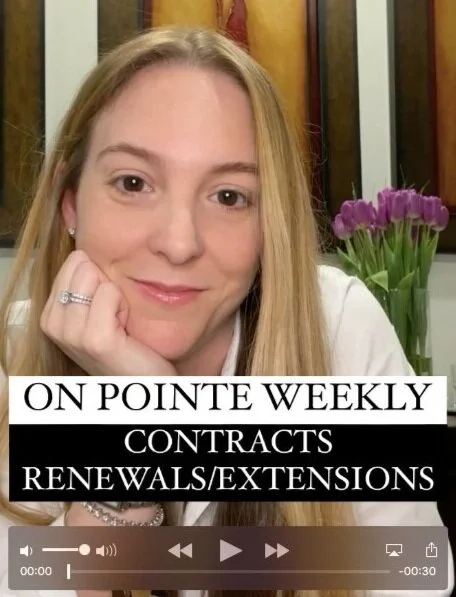Contract Renewals & Extensions
Q. How do you discuss a contract renewal or extension with a client without sounding pushy?
This is a fair question. When you get to the point of needing to renew or extend, things can get awkward. It usually stems from a discomfort in discussing finances + not having a set process to lean on.
With this in mind, let's tackle the process part first since once you set it in place, you'll have something to lean on each and every time!
At the beginning of any potential client relationship, explore the details that will need to be included in a contract. Consider renegotiations, timeframe, project types, budget, renewals and extensions. Once you have a sense of what's important and what your expectations are for the work, write in an option for renewal and extension conversations that help safeguard your work, time investment and continuity.
For example, if you have a client that agrees to a 3-month project but you get the sense that this is an arbitrary timeline and you can add value beyond that point, include a clause to discuss a contract extension at the 45-day mark. You can even say that an addendum can be added up to a 12-month period at which a contract renewal will be discussed 60 days prior to end date.
In doing this, you set the timeframe on your calendar and during a regularly schedule weekly client call, you bring this up as one of the agenda line items. You site the contract and remind the client of their options. You then have 45-days (per the example provided) to touch base with the client on how to proceed - whether that be extend or not based on the work in front of you both.
...
Now, that's great that we've discussed the process. But let's be real, we wouldn't be talking about this if a process were already in place. That means you're likely already in or going to be in a place where you need to find a way to discuss renewing a contract without an 'in' on how to bring it up.
This is where your approach matters.
You must be tactful, thoughtful, assertive and understanding - all at once!
My recommendation is to develop a timeline for yourself. Evaluate and ask yourself:
How many days until the contract expires?
How many scheduled touchpoints do you already have with the client?
What work is there that will help support the push to renew or extend the contract?
When you have a sense of what these answers are, you candevelop the game plan on how to approach the conversation.
For example, let's assume you have a final deliverable due in 2 weeks.
The week before,schedule a client callto discuss final details for that deliverable, what the client can expect and to first broach if the client plans to extend the contract. During that time,express how much you've enjoyed working together, where there's value to continue the relationship and what you foresee as 'going over' the allotted contract time.
If at this point the client says something to the effect of 'thanks I'll consider and get back to you', start planning for your second touchpoint. Based on that type of response you don't yet know if they are being sincere or blowing you off, if they have the funds or not.
Upon delivery of the final deliverable, ensure there's a call scheduled for you to present the product. During that call,again inquire about a project extension. This time,focus on additional work you'd like to do and why it would be valuable to the client.Express what loose ends need to be tied up, what opportunities are on the table and how close you are to something big.
Let's assume at this point you sense there's interest in continuing but something is holding the client back from signing a new contract or extension right there.
Plan a final follow-up 1-2 weeks after your last touchpoint with them. During this (hopefully) call or email, tease them with something new you've done for them - perhaps news that's of interest, an opportunity you've secured, an idea you have for them.
It's at this point that you'll know 2 things.First, you'll know if you've closed the deal for them to return as a client and extended your work together. Second, you'll know if there's interest or means to do so. If it's a budgeting problem, most clients will be upfront and say they don't have the funds. This means they should go on your list of people to follow-up with in a few months time to 'check-in' and see how they're doing because an article, life event or similar reminded you of them. If there isn't any interest, this is usually when they blow you off, stop responding to messages or string you along. If this is the case, it's time to move on.
Don't worry though - moving on is power. You know where you stand, you know what you're capable of, what you've accomplished and you know the opportunities ahead.
...
This was a long one, friend, but an important one. Contracts are part of every business from PR, social media and marketing to real estate, art and beyond.
The art of negotiation, conversation and renewal is what will drive your business forward. The hope is these tips start you on the right path!
...
If you have more questions or the examples didn't apply to your scenario, let me know, my inbox is always open. You can reach me at Cristy@PointeConnect.com.
Cheers to being on pointe!

